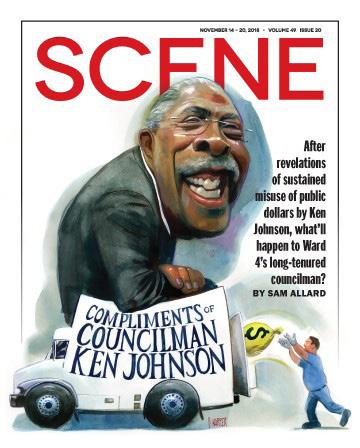
17 minute read
Upfront
UPFRONT UPFRONT

Advertisement

Councilman Ken Johnson Arrested on Corruption Charges, Finally
CLEVELAND CITY
Councilman Ken Johnson was arrested by local FBI officers Tuesday morning after a federal grand jury indicted him on 15 corruption-related charges.
The charges stem, per the Department of Justice, from a scheme in which Johnson and his assistant, Garnell Jamison, defrauded the city by submitting false monthly expense reports for a decade. Johnson received the $1,200 monthly maximum as reimbursement for “ward services” that were never performed. Johnson is also alleged to have benefitted from federal dollars he steered to the Buckeye Shaker Square Development Corporation.
Johnson, Jamison and the former head of Buckeye Shaker Square Development Corporation, John Hopkins, were all arrested Tuesday. Johnson is expected to appear, by videoconference, in federal court later Tuesday.
“The allegations set forth in today’s indictment detail the exploitation of public office for personal gain,” said Acting U.S. Attorney Bridget M. Brennan, in a DOJ press release. “Such conduct may bring about a temporary financial benefit for those involved, but it harms the public’s confidence in its elected officials.”
Equally harmful, no doubt, is the fact that these alleged crimes, and a panoply of related corrupt activities, have been out in the open for nearly three years. Former Cleveland. com columnist Mark Naymik was breaking a new scandalous Ken Johnson story on what felt like a daily basis though the summer and fall of 2018,and hardly anything was done about it. Johnson was permitted to keep his council sinecure, where he’s been double-dipping since 2013, with no repercussions of any kind.
Talk about harming the public’s confidence in elected officials!
The city made statements about investigating the allegations in Naymik’s reporting, and Council President Kevin Kelley, to avoid a cascade of negative PR and deeper investigative reporting, stopped allowing the monthly reimbursements. An outside auditor determined, in the aftermath, that a number of council members other than Johnson, including Kelley, were improperly filing their monthly expense reports. Joe Jones, Kevin Bishop, Kerry McCormack, Mike Polensek, Anthony Hairston, Dona Brady, Anthony Brancatelli, Jasmin Santana and Brian Kazy were also named.
Kelley then vowed to “tighten rules” governing these monthly reimbursements.
The whole of Cleveland City Council should be squirming at this moment. They likely know that the FBI has been making the rounds in Ohio, and that Ken Johnson very well could be the first domino to fall in Cleveland. In 2020, Cincinnati was rocked as three council members there were charged with accepting bribes related to development deals. Four council members in Toledo were also indicted in a bribery and extortion scheme last year. Who›s next? -Sam Allard

Mayoral Candidate Basheer Jones’ Campaign Finance Report Raises Red Flags
The unaudited year-end campaign finance report for Ward 7 Cleveland City Councilman Basheer Jones raises a number of serious red flags.
Jones is an author, speaker and the first Muslim to serve on City Council. He has publicly stated that he intends to run for Cleveland Mayor in 2021 and in fact pulled petitions at the Cuyahoga County Board of Elections in recent days. As with other candidates, his campaign activities require ongoing scrutiny. But that scrutiny has proven difficult to apply. On his 2020 report, filed in late January, virtually all of his contributions were listed without names attached.
The report reflects that Jones raised more than $80,000 from June 29 to Dec. 31. Among the Cleveland mayoral hopefuls, that’s more fundraising than all but Council President Kevin Kelley and young executive Justin Bibb. Only two of Jones’ nearly seventy individual contributions were identified by donor name: Kanubai Patel and Pratimaben Patel of Wickliffe gave $500 and $550 to Jones, respectively, in August.
The majority of the other contributions appear to have been made on Jones’ Act Blue site, but were tabulated in his report without identifying details. That’s against the law.
A Cuyahoga County Board of Elections’ spokeswoman confirmed to Scene that the BOE had been in contact with Jones’ treasurer, who pleaded ignorance and said she was working to update the report.
One of the line items, however, was a $12,086 contribution made on Nov. 4. Regardless of the contributor, that far exceeds the maximum allowable contribution for Cleveland mayoral candidates. The cap was set by city council in 2016 at $5,000 for an individual and $7,500 for a political action committee.
Jones’ expenditures raise eyebrows as well. He spent $44,000 in 2020 — a non-election year — and paid a number of individuals and entities for work presumably unrelated to his campaign. In many instances, the descriptions of these payments were either gently massaged or wholly mischaracterized to present them as legitimate election activities.
The largest contributions were to Jones’ friend Youssef Kromah, with whom he traveled to Egypt in December. Two expenditures totaling $6,500 to Kromah — erroneously spelled “Youssef Komah” in the report — were allegedly for Kromah’s work as a “campaign strategy and marketing consultant.”
Kromah is a self-described poet, author, public speaker, community activist and television host. His address listed on Jones’ report is Philadelphia, though Kromah’s website says that he is currently a student at the University of Cairo. His Facebook page also says that he currently lives in Cairo. Jones did not respond to multiple requests for comment submitted via phone and email about the 2020 report. Kromah, too, did not respond to an emailed series of questions. A voicemail was not returned.
As evidenced from their Instagram accounts, though, Kromah accompanied Jones for portions of his December trip. He noted in a December 7 post that he and Jones had “adopted” an orphanage in Aswan, Egypt and had donated 30,000 Egyptian pounds (the equivalent of about $2,000 USD) to cover the expenses of the orphans there.
It’s unclear if a portion of Jones’ payments to Kromah went to the orphanage or for other purposes — the trip itself, for example — but the second payment to Kromah, for $4,000, occurred on Dec. 3, shortly before Jones departed.
Jones also listed an expenditure of
UPFRONT

$1,500 for a “Quaran School in Senegal” [sic] in January.
Charitable donations are a permissible use of campaign funds, provided the organization receiving the funds is a nonprofit, duly designated by the IRS, or otherwise approved by the Ohio Elections Commission. Campaign funds are otherwise restricted to costs associated with an election. Advertising and promotions, staffing, events, etc.
Through 2020, Jones’ campaign made a number of payments to individuals and LLCs for services that they do not typically provide.
Jones paid $500 to a healthcare coordinator for “administrative services,” for example. He paid $1,000 to an Islamic studies teacher in Tampa, Fla., for “writing/content consulting.” He paid $3,200 in two payments to King Management Group, an LLC incorporated in 2017 “to provide comprehensive school management services” for “marketing/branding services.” Representatives from the King Management group did not respond to multiple phone calls from Scene.
One of the more suspect recipients was an organization called the WPM Group, whose services are described on LinkedIn as “landscaping, snow plowing, professional services, janitorial, property management, entertainment (promotions etc.), flagging co.” Jones gave $2,870 to WPM in three payments ($1,270, $1,100, and $500), ostensibly for “public relations.” These payments were all made in late October and November, shortly before Jones moved into a new house in Hough.
When reached by phone, Rico Webster, CEO of WPM Group, said that his wife could provide details about their work for Jones. When Ebony Webster was reached by phone, she said she had no comment.
When Scene contacted Jones one final time via Instagram to give him an opportunity to clarify his payments or provide a statement, he directed us to Ebony Webster, whom he identified as his communications director.
Webster, when reached by phone again, identified herself as Jones’ Communications Director and said the payments to WPM Group were for her services in that role. How long had she been Jones’ communications director, Scene asked? Webster would only say that it was a recent development.
To a series of other questions related to the 2020 report, Webster provided a written statement from Jones.
“We are aware there are some amendments that need to be made to the recently released financial report,” the statement read. “Our financial team is working to get that done. I am dedicated to my role and responsibilities as a City leader and councilman. Because of that, I have consultants assisting me and advising me in making the best decisions.” -Sam Allard

Photo via Scene archives
Instead of Announcing Mayoral Run, Kevin Kelley Launches “Listening Tour”
City Council President Kevin Kelley has launched a neighborhood listening tour that will help him determine, he says, whether or not he will run for Mayor. From Feb. 17 through Mar. 23, Kelley is hosting Zoom meetings with each of the City of Cleveland’s 17 wards to hear residents’ concerns about the city.
“Many Clevelanders feel that they haven’t been listened to,” read a Kelley quote in a citywide mailer last weekend. “I want to hear from them about conditions in their neighborhoods. That’s the most important part of my job.”
Feedback from residents was billed, in the mailer, as a precondition for Kelley’s campaign launch. “Will Kevin Kelley run for Mayor of Cleveland?” It teased ... “Not before hearing directly from the people in every neighborhood.”
As many have noted on social media, residents don’t “feel that they haven’t been listened to”; they straight-up haven’t. Look no further, they say, than Kelley’s refusal to institute public comment at City Council meetings. If listening to residents is indeed the most important part of his job, why has he barred them from speaking at the one venue where they’d regularly have his attention?
Kelley has an enormous campaign war chest — more than $500,000 on hand, as of January — and has been laying the groundwork for a mayoral run for nearly a year. Unlike Sen. Sherrod Brown, whose “Dignity of Work” tour resulted in his decision not to seek the Democratic nomination for president in early 2019, Kelley’s listening tour is much more like an extended pre-launch campaign event, part of a larger effort to rehabilitate his image. As a frontrunner and cash-rich candidate in a field increasingly marked by timidity, deciding not to run would be an astonishing move, (unless his advisors convince him that running for Cuyahoga County Executive in 2022 is the smarter play.)
And yet, if Kelley won’t announce until the conclusion of this listening tour, his campaign can’t officially get underway until late March. The primaries are in September.
In the press release announcing the tour, Kelley’s team called the individual ward events “town halls,” and said that Kelley would “kick off the discussion and answer as many questions as possible from participants.”
“Residents are encouraged to join, engage in conversation, and have a chance to be heard on the issues that matter to them the most,” it read.
But the format for these so-called town halls has led to criticism. After the first week of meetings, a group of Cleveland activists and ward leaders who last month sent a letter to Kelley calling for increased transparency and democracy at City Hall noted that Kelley’s events were set up as “Zoom seminars.” That means Kelley is the only face visible on the call. Furthermore, all questions are prescreened. “I thought these were for him to listen to us,” an attendee told Scene, “not for us to listen to him.” -Sam Allard
Boy Commissioner Lee Weingart Running for County Executive in 2022
If Dennis Kucinich was Cleveland’s boy mayor in the late 1970s, Lee Weingart was Cuyahoga County’s boy commissioner nearly two decades later.
Weingart took office in 1995, at the tender age of 28, forsaking the law firm of Jones, Day, Reavis & Pogue to do so. He was and remains a card-carrying Republican, and he lost his re-election bid after one term, as Bill Clinton swept the county by 175,000 votes in 1996. (Weingart is quick to mention, however, that he only lost by 30,000 that year.)
Now, after nearly twenty years running his own lobbying firm in downtown Cleveland, Weingart says he plans to run for Cuyahoga County Executive. He filed paperwork with the Cuyahoga County Board of Elections last week.
He told Scene in a recent Zoom interview that he’s going to devote the next 20 months to the campaign and
noted that if he wins in 2022, he’ll return to public office twice as old as he was when he won the first time around.
For Weingart, the mismanagement of the Armond Budish administration has inspired him to seek office. In no particular order, he referenced the county jail scandal, the ongoing corruption investigation, the fiscal missteps related to Covid-19 and the misappropriation of CARES Act dollars.
“This county government is in disarray,” he told Scene. “We thought a new form of government would solve the problems of corruption and transparency, but what I’m seeing is a county that’s more corrupt and less transparent than it was a decade ago.”
Weingart said he wants Cuyahoga County to be “government for the people, not government for itself.” He said he plans to deploy some of the same strategies that were effective back in the 90s: dramatically decreasing county costs by reducing non-essential spending and bureaucracy, and using the surplus to fund community projects and economic development initiatives.
The policy planks of his platform — summarized in a one-pager attached below, titled “Cuyahoga 2030: Rebirth of a County” — emphasize what he referred to as competent fiscal management. Not only does he want to trim the county’s payroll via attrition and voluntary buyouts; he wants to put every county contract and county salary online for the public to see.
When Scene asked how his costcutting measures squared with the region’s high unemployment rates — the County itself representing a major employer — Weingart said that attrition and voluntary buyouts were designed to target those of retirement age or very close to it. “The goal is not to fire anyone,” he said. And his vision is that the savings will flow directly to community projects, managed largely by local nonprofits. In theory, this will create more jobs than the county loses at its headquarters. When Scene questioned whether his pursuit of efficiency would result in the same jail scandal that Budish oversaw with his quest to turn the jail into a regional profit center, Weingart was definitive: “No. There are some costs you can cut and some you just can’t.”
Unlike many Republicans, Weingart balks at “law and order” rhetoric and says he supports criminal justice reform on both the front and back ends. Moreover, he said he’s suspicious of plans to rebuild the county jail.
“We need reforms that keep people out of jail,” he told Scene. “Nondangerous arrestees should never set foot in the jail. We need to speed up arraignments, promote alternative sentencing and have faster trials to process people more quickly.” He said he’s interested in creating programs using models like EDWIN’s to create employment pipelines for ex-offenders, and he supports the creation of a dedicated county expungement court.
“Look, I don’t have traditional Republican ideas in some areas,” he said, “but I still have an R in front of my name, and I’ll have to overcome that label in Cuyahoga County.”
In order to do so, Weingart says he’ll have to raise quite a bit of money. He has set the ambitious goal of $3 million, but said he has spoken to more than 250 people about his campaign and has received commitments that give him optimism.
He believes, he said, that the flagrant misdeeds and nonstop scandalous headlines of the Armond Budish administration should demonstrate that the County Executive position is not partisan.
“You don’t need to be a Democrat to be the county executive, even in a Democratic county like Cuyahoga,” he said. “More than anything, the position calls for someone who understands county government and who has a vision. This county also needs a spokesperson, someone who’s unafraid to come out and say it like it is.”
Weingart, who lives in Shaker Heights, said that his economic development strategy would focus on attracting jobs to the city of Cleveland, closer to where the most people live. He said that new jobs remain the best way to attract more people to the region and to prevent the migration of the county’s most productive people. He even floated the idea of asking Gov. Mike DeWine to send some state government jobs to Cleveland, “to spread the largesse around.”
Attracting jobs was one of four pillars of Weingart’s first campaign, back in 1994. Alongside jobs, Weingart won the seat on promises to reform welfare, make the government more efficient and not raise anyone’s taxes.
His pitch in the 2022 race will be derivative, with similar priorities about efficiency. But this campaign will also be inflected with criticism of the incumbent Budish, and policies that that he sees as countermeasures to Budish’s failures.
“I believe that government ought to be run on the principles of persuasion, reason and facts,” he told Scene. “What I’m seeing in this administration is government run on coercion, leverage and misdirection. I want to bring back honest government.” -Sam Allard
DIGIT WIDGET
$70 million
Current funding for public transit in the state of Ohio.
$150 million
Total proposed funding for public transit in Ohio, in bill sponsored by local Reps. Mike Skindell (D-Lakewood) and Terrence Upchurch (D-Cleveland).
$7 million
Total funding for public transit in Ohio in budget proposed by Gov. Mike DeWine, a 90% decrease from current levels.
$50 million
Cost of marketing proposal touted by DeWine to encourage young people to move to Ohio, in part for the state’s supposedly progressive polices and welcoming environment.
Bipartisan Statehouse Bill May Finally Abolish Death Penalty
A bipartisan group of Ohio lawmakers will soon introduce legislation to abolish the death penalty in Ohio.
State Sen. Nickie Antonio in a virtual press conference last week said, “There is a team right now that is dedicated to ending the death penalty in Ohio. And that team can only get larger.”
The bill will be similar to the one Antonio introduced with a Republican co-sponsor last year that would also transition all current death sentences to life in prison without the chance of parole.
Ohio is one of 28 states that currently has the death penalty, though the state hasn’t executed an inmate since July 2018 after the lethal injection cocktail used by the state came under scrutiny and Ohio struggled to find a manufacturer willing to sell it the necessary drugs.
Antonio said she currently has commitments from four Republicans to co-sponsor the bill — Sen. Steve Huffman of Tipp City, Rep. Niraj Antani of Miamisburg, Sen. Kristina Roegner of Hudson, and Rep. Jean Schmidt of Loveland.
Momentum has built in conservative circles in recent years to do away with the death penalty, including from a statewide group called Ohio Conservatives Concerned About the Death Penalty that launched early last year.
“As we have seen in recent polling, public opinion has dramatically shifted against Ohio having the death penalty. Conservative’s evolving views of the death penalty have been a major reason for this movement of public sentiment,” OCCADP member Michael Hartley said today in a statement. “Ohio is a pro-life and fiscally conservative state. The death penalty no longer represents Ohio’s values and it is time for our state to finally repeal this policy.”
Supporters argue that the system is inherently flawed — according to the Death Penalty Information Center, 166 Death Row inmates have been exonerated since 1973.
And beyond the moral arguments at play, note that death penalty cases cost taxpayers 10 times the amount of non-capital cases.
“The death penalty is expensive, inhumane, impractical, unjust and often erroneous. Abolishing it is a practical solution,” Antonio said in a release. “This is not a Republican or a Democratic issue. No matter what a person’s reason is for supporting this legislation, we all agree that this is critical for our own collective humanity. It is our responsibility to work together across party lines and legislative chambers and move forward to end the death penalty in Ohio.”
DeWine has remained noncommittal on the issue but has said no executions would go forward in Ohio unless the legislature approved a method that wasn’t lethal injection and, in interviews last year, distanced himself from being a capital punishment supporter. -Vince Grzegorek




